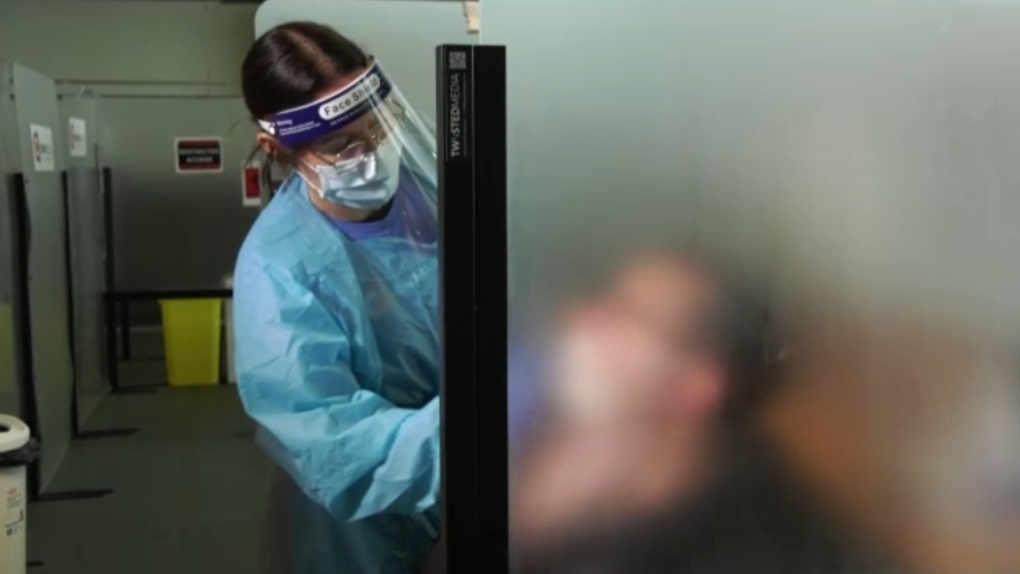Court upholds $5,750 fine for B.C. woman who refused COVID-19 test at border
 A health-care worker administers a PCR COVID-19 test in an undated image.
A health-care worker administers a PCR COVID-19 test in an undated image.
The B.C. Supreme Court has rejected a woman's bid to overturn a $5,750 fine she received after refusing to undergo a COVID-19 test at the border.
The court heard Nora Donahue declined the PCR test while crossing into Canada from the U.S. last September, which resulted in her being ticketed under the Quarantine Act.
"She believes that it was wrong for the government to require her to take a PCR test, and that the rules established pursuant to the Quarantine Act violated her constitutional rights," Justice H. William Veenstra wrote in his decision, which was posted online this week.
At the time Donahue was fined, travellers were required to provide proof of a negative PCR test before entering the country. Some who were tested still faced thousands of dollars in fines because they used the wrong kind of test.
The court heard Donahue filed a dispute against her ticket in October 2021, but didn't attend the subsequent hearing in Surrey provincial court in January 2022, and that the fine was upheld.
Undeterred, she made another attempt to contest the ticket in April 2022, filing an application in provincial court in which she cited "lack of informed consent, personal health privacy violation, constitutional violation" as her defence. Donahue also argued she had been out of the country for months prior to her hearing and was never properly notified of the date.
That application was rejected.
Finally, Donahue brought the case to B.C. Supreme Court through a civil claim against the province's attorney general and the Insurance Corporation of British Columbia. Part of ICBC’s role is to collect fines on behalf of the government.
The defendants argued Donahue's case amounted to a "collateral attack" on the decision of another court, something that could only appropriately be challenged by way of a judicial review.
Veenstra agreed and dismissed the claim.
"While an unfortunate result for the plaintiff, it seems clear that this is a classic case of an action making a collateral attack on a valid decision of a court with authority," he wrote.
The possibility of Donahue challenging the fine through a judicial review is "a matter for which she should seek advice from appropriate sources," Veenstra added.
The judge also ordered Donahue to pay the defendants' costs.
CTVNews.ca Top Stories

BREAKING Quebec man, 81, gets prison sentence after admitting to killing wife with Alzheimer's disease
An 81-year-old Quebec man has been sentenced to prison after admitting to killing his wife with Alzheimer's disease.
Pat King found guilty of mischief for role in 'Freedom Convoy'
Pat King, one of the most prominent figures of the 2022 'Freedom Convoy' in Ottawa, has been found guilty on five counts including mischief and disobeying a court order.
Canada's tax relief plan: Who gets a cheque?
The Canadian government has unveiled its plans for a sweeping GST/HST pause on select items during the holiday period. The day after the announcement, questions remain on how the whole thing will work.
Canada issues travel warning after 6 people die from tainted alcohol in Laos
The Canadian government is warning travellers following the deaths of at least six people in the mass poisoning of foreign tourists in Laos after drinking tainted alcohol.
BREAKING Jury convicts men of human smuggling in case of frozen migrant family in Manitoba
A jury has found two men guilty on all charges related to human smuggling in a case where a family from India froze to death in Manitoba while trying to walk across the Canada-U. S. border.
Canada's new income tax brackets in 2025: What you need to know
The Canada Revenue Agency has released updated federal income tax brackets for 2025, reflecting adjustments for inflation. Here’s the breakdown.
Measles outbreak: Canada sees highest number of cases in past nine years
Thirty new measles cases were reported this week in Canada, bringing the total number in Canada to 130 in 2024.
Unruly passenger duct-taped after trying to open a plane's door mid-flight
An assertive group of cross-country travellers pinned and duct-taped an unruly passenger mid-flight, after he allegedly tried to open a plane door at 30,000 feet.
Matt Gaetz says he's not returning to U.S. Congress next year
Former Florida Rep. Matt Gaetz, who withdrew from consideration as U.S. president-elect Donald Trump’s pick for attorney general on Thursday, said Friday he will not be returning to U.S. Congress next year.

































